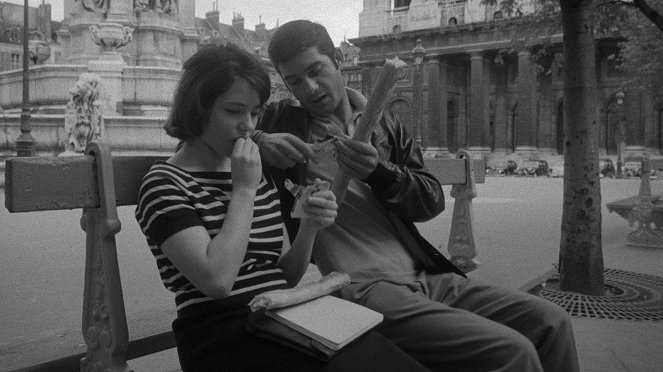Directed by:
Jacques RivetteCinematography:
Charles L. BitschComposer:
Philippe ArthuysCast:
Betty Schneider, Giani Esposito, Françoise Prévost, Daniel Crohem, François Maistre, Jean-Claude Brialy, Jean Martin, Henri Poirier, Jean-Luc Godard (more)Plots(1)
Anne, a student in Paris, becomes involved with a group of her brother's arty friends and gets sucked into a mystery involving Philip, an expatriate American escaping McCarthyism; Terry, a self-destructive femme fatale; theatre director Gerard; and Juan, a Spanish activist who apparently committed suicide, but was he murdered? Philip warns Anne that the forces that killed Juan will soon do the same to Gerard, who is struggling to rehearse Shakespeare's Pericles. Anne takes a part in the play in an attempt to help him and also discover why Juan died.
Rivette started making his first feature in 1957 and completed it slowly over a period of two years, as money allowed. Finally released in 1961, Paris nous appartient brilliantly captured the mood of paranoia and uncertainty of that Cold War period. Rivette's rarely seen debut is one of the most important and far-reaching of the early New Wave films. Rivette's disquieting film, suffused with sexual and political tension, is as much about its setting a long-vanished Paris full of fleabag hotels and corduroy-clad intellectuals as about its story. It features guest appearances from fellow New Waver directors Claude Chabrol, Jean-Luc Godard and Jacques Demy, a striking musique concrète score, and stunning cinematography in black and white, which manages to be luminous and ominous at the same time.
(British Film Institute (BFI))
Reviews (2)
Rivette’s approach to the characters in his pseudo-crime drama is indicated by the introductory quote from Charles Peguy, “Paris belongs to no one.” This statement not only contradicts the title of the film, but it also does not correspond to the opinions of most of those involved, who think that the city on the Seine belongs to them and that they have the exclusive right to set the rules of the game (didn't the self-confident cinéasts of the French New Wave think the same thing?). In order to give their petty existence greater meaning, they play the heroes of a grand (Shakespearean) tragedy, convincing themselves that they are involved in an international conspiracy. They choose the perspective from which they want to see their trivial problems. However, the film does not take a helpful approach toward them – it doesn’t artificially create dramatic tension or support the crime-thriller framing by employing genre conventions. With the exception of several “spy” shots from a bird’s-eye perspective, which indicate that the protagonists do not hold their fates in their own hands, as they believe they are just pawns in a game played by someone more powerful, probably the director (the “game” interpretation is supported by the repeated use of a chessboard motif in the mise-en-scéne). ___ Thanks to the stark rendering, the vanity of Parisian intellectuals is made clear, as they are closed off in their contrived worlds, convinced of their own great importance and untouchability. They are ridiculous in their empty debates and in the absurd constructs that they have to create in order for something dramatic to happen in their lives. I believe the overly intellectual nature of the protagonist was intended to be a means of parodying the pretentions of such people. However, this extremely uncommunicative (almost autistic) film does not offer any certainty with regard to its intentions in this or in any other respect. ___ The characters delight in mysteries, talk in riddles and take nothing seriously. With the exception of the somewhat defenceless main female protagonist, who, though she is much more sensitive than all of the men, is all the more susceptible to the artificially evoked idea of a major conspiracy and we should thus rather not take her as a reliable guide to the narrative. ___ Rivette’s feature-length debut is a more contemplative film than the breakthrough works of Truffaut and Godard. It doesn’t have the spontaneous flair Breathless, let alone the warmth of The 400 Blows. It dives unhurriedly into the paranoid social climate of Paris, or rather the whole of Western society, at the end of 1950s. Under the influence of Pirandello’s theatre experiments, Rivette considers the possibilities offered by the intertwining of real and possible worlds (in some scenes, the characters smoothly transition from theatrical dialogue to common speech). He utilises the atmosphere tainted by the fear of nuclear war and the Babel-like confusion of languages (a shot from Metropolis) while belittling both. ___ Paris Belongs to Us is not an entertaining film, nor is it long enough to have an impact on our perception of time (as in Rivette’s later work), nor do I think it’s directing is anything to write home about, but it at least helps to form a more complete picture of the “milieu” in which the French New Wave was born. 60%
()
(less)
(more)
Fighting against fascism in Spain is difficult, but fighting against a worldwide, amorphous fascism without a name and without borders is even harder. It is no wonder that in such a paranoid and hopeless battle, people start to commit (suicide) murders. In the face of an apparently non-existent enemy, even more internal strength, perseverance, and inner determination are necessary, which not everyone can bear. The test may come soon, perhaps during rehearsing an unpromising Shakespeare play. Who will prevail? Is it the effort to make a play according to one's own conviction, even if it may be less palatable and economically unprofitable for the audience, or surrendering to the dictate of external forces? Maybe they are the enemy we have been trying to see all along. (Or maybe not, who knows what Rivette wanted to say...)
()

